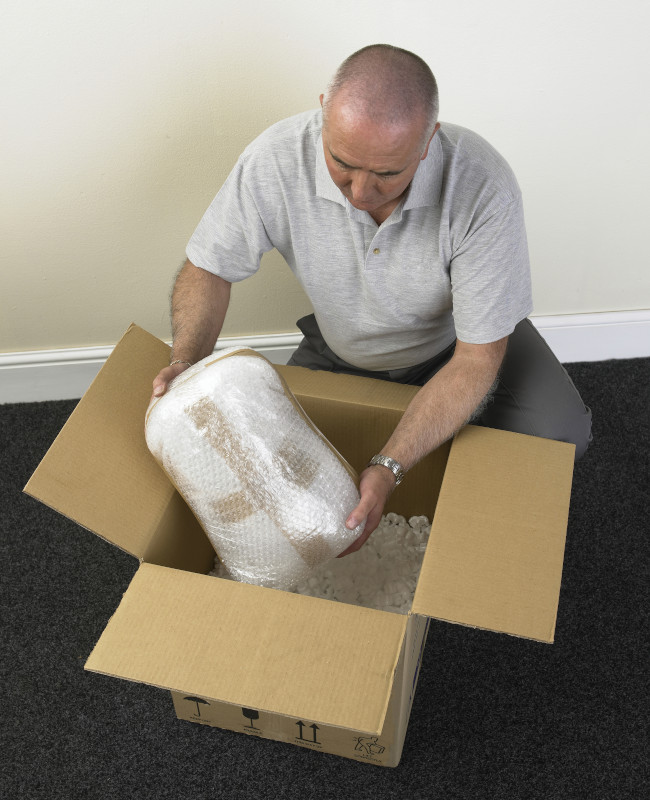One of the most time intensive aspects of any move is the process of packing (boxing) up the smaller items in your home like clothes, pots, pans, dishes, stem ware, office supplies and other items that cannot be transported loose. The first decisions to make are do you want to hire a Professional Packing Services when moving and is it worth the cost?
If you are doing a DIY yourself move you have more latitude in terms of what you can ship. This is because your goods are most likely not going to be on a commercial motor vehicle. If you have hired a professional packing and moving crew there are some important limitations to consider.
When moving with a professional moving crew before packing an item ask yourself “Is this flammable, corrosive, explosive, pressurized or will it cause stains if it leaks?” If the answer is yes; it should not be shipped on a professional moving van nor left with the assumption a professional packing crew will pack it.

Additionally, you should consider items that are highly fragranced. If it has an overpowering aroma, it may be flammable, even if it is not volatile it is best not to pack it. If it were to break or leak it could potentially fragrance stain other items in your shipment.
Professional packing by moving crews will not pack items such as gas, kerosene, oxygen tanks or any other liquid that is flammable, corrosive or explosive. You cannot ship anything that is pressurized such as oxygen tanks or aerosol cans. As a professional packing crew packs their way through your home they will leave items such as these grouped on top of a counter so that you can go by afterwards and gather them up.
Professional packers will not pack ammunition that contains powder or primers of any kind. Nor can they take batteries of any kind (which rules out hoverboards.)
While all professional movers differ in terms of what they will or will not ship, plan to not ship any liquids of any kind. If you plan to not take any liquids you are prepared for whatever regulations your professional packing and moving crew has to operate under. They will then take anything that their carrier does allow.
A professional moving company’s packing crew will pack everything that they are allowed to by regulation. They will do it on a room-to-room basis. By the time your packing service date arrives it is imperative you are ready to go. Anything that is not to be taken by the mover should be segregated into a specific area of the home or room and clearly labelled “Do not pack/move.”
Professional packing crews do this professionally on a daily basis and their pace of packing is much faster than the average customers’ packing pace. It is imperative that you are ready to go, the laundry is done, the dishes are washed and dry, the shower curtains are dry, the linens are removed from the beds, the flatscreen TVs are dismounted, the appliances are disconnected, etc.
How long it takes the packing crew to finish packing your home depends on several factors. First, how much needs to be packed. Most homes can be packed in one day. Some homes require two days and occasionally very large shipments may require 3 or 4 service dates dedicated to boxing everything up.
How many people are on the crew can affect how long the packing takes. One packer may take five or six days to pack an expansive six-bedroom home whereas a crew of eight people may do it in one day. Moving companies assign their staff based on their strengths. So in regards to professional packing service times and dates try to be flexible. If the moving company scheduled one day to pack but asks if they can come and pack three days this is a sign.
If you can accommodate it with little inconvenience you should try to do so. This is because the moving company is very busy and they want to send you one very good packer rather than sending you one very good packer and two guys who are more proficient at loading then packing.
The packing crew will want to leave your beds set up until loading day. However, if you have beds that you don’t need let them know so they can pack up the mattresses and box springs in advance.
There is no insurance in the household goods industry in regards to your belongings. While moving companies carry general liability insurance, workers compensation insurance, auto insurance, warehouseman’s insurance and a host of additional insurance there is no insurance on your goods. Your goods are covered under valuation.

Valuation assigns the value of your goods should there be any damage. This can vary between Full Value (Replacement) Coverage with various deductibles levels or Basic Coverage which values the goods at $0.60 per pound per article. (Most major carriers consider household goods to be valued at $5 – $8 per pound.) Basic Coverage values your goods at significantly less than their replacement value.
IT IS ALSO IMPORTANT TO BE AWARE THAT THE VALUATION YOU SELECT ALSO SETS THE AMOUNT YOU WILL BE COMPENSATED IF THERE IS A CATASTROPHIC LOSS OF YOUR PROPERTY.
When it comes to packing claims there are some important distinctions to understand:
PBO (packed by owner): On these cartons the carrier is only liable if there is visible damage such as a crushed corner, it is open, a hole is poked through the side, it has been crushed, its wet or it is completely missing. THIS IS WHY IT IS IMPERATIVE TO PACK BOXES COMPLETELY FULL SO THEY DON’T SAG AND CRUSH IN ON ONE ANOTHER. Not packing them full could also add the stress of a driver refusing to load them if there are too many for him to “top load” them all.
If none of the aforementioned conditions exist and something in a carton is damaged the carrier IS NOT LIABLE as this is deemed faulty packing technique.
If you are doing your own packing it is crucial that all boxes are properly assembled and taped shut fully and completely. There cannot be items protruding from seams and opened top boxes can be refused by the van foremen. If you have questions about how to pack in preparation for a move please reach out to your Relocation Consultant.
CP (carrier packed): These are cartons for which the carrier provided the materials AND the labor to pack them. In these circumstances the carrier is liable (under the valuation you selected) for any and all damaged items in that carton.
How much professional packing and moving services costs varies widely. When it comes to packing services; it is dependent upon how many boxes need packed? Full service is packing the entirety of the home. Many customers opt for a fragile pack where they pack everything that they are comfortable packing then have the packing crew box up all the fragile items the customer is uncomfortable packing.
Your location can also drastically affect the cost of these services. Typically, a full pack for various sized residences is going to run between a low end of $1000 to $4000 but an exceptionally large shipment could push into the $7,000 or $8,000 range. If you need items crated this would push the costs higher.
When doing a comparison between PBO and CP options it is important to factor in the cost of materials, your time acquiring them and your time spent doing the packing services yourself. In a full cost analysis, you may find that the additional money you spend on a professional packing crew will be money well spent.
In the household goods moving industry packing and loading (and unloading) are different terms for different aspects of the service you are being provided. Packing refers strictly to boxing up all the small loose articles prior to loading. Packing is the stage that prepares a shipment to be loaded.
Loading is the actual process of removing all the items from your residence, placing them on the truck, properly padding and (rubber) banding them and then securing them in the truck so they cannot shift.
Transit is the one part that the customer is not present for as the van foreman is driving from the origin address to the delivery address. Unless it’s a local in which case we may be in traffic together!
Unloading is the process of delivering the items into your new home and re-assembling anything the carrier disassembled.
The key to a successful, stress-free move is always planning well in advance. Get your estimates 5-7 weeks in advance if you are able. Do your cost comparisons and decide if you are a DIY mover or going the professional route.
If you are hiring a professional packing and moving crew make sure you game plan with your Relocation Consultant to insure you understand what your obligations are versus those you are paying them to fulfill.
Create a plan and then execute it and starting doing everything and anything that can be done in advance to minimize the amount of work you have left to do when you get into the last 5 days prior to your service dates.
